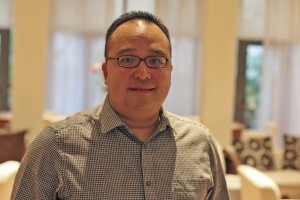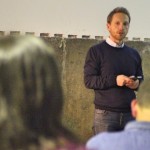We sat down with entrepreneur and investor Roger Yee as he was in Barcelona last week to mentor Spanish founders and entrepreneurs.
Yee is based in Washington D.C and has founded and been CEO of several cyber security and open source companies, but he has also mentored and helped hundreds of early stage startup CEO’s over the last 7 years through Founder’s Institute.
He explains that a lot of the Spanish entrepreneurs he talks to are over-focused on how to get to the US, asking him how to set up shop and where.
Stay in Europe

Roger Yee – Entrepreneur & Investor
Yee believes, like most investors, that your product should be scalable and international from day one, but underlines that you should master your own culture and country before you look to the US.
I usually recommend start-ups not come to the US, it’s chaotic and usually not worth the effort for an early stage startup. As a European founder, you’re probably much better connected in your own city and country, compared to leaving and compete against locals in the US.
He continues:
What I tell all CEO’s I mentor is to use and build your network actively and understand the difference between management and leadership. You’ll never regret it, and you’ll be surprised what a strong network can help you achieve.
When he’s in Spain, he’s mainly teaching through Founder Institute in Barcelona, but he’s also giving feedback on the ideas of the entrepreneurs:
My style of feedback is first of all, being open-minded, especially when I don’t know the industry space personally. But I’m always trying to understand how they’re solving a problem, how you’re doing it differently than others, and why exactly you are doing it.
The B2B year of startups
Even though Yee still thinks there exists a big potential in consumer products, he sees a venture capital industry that’s getting smarter, and will in his opinion start to look much more for B2B businesses.
He is personally investing in startups through a DC-based firm called Fortify Ventures, made up by local founders and business angels.
My background is from enterprise software, and I’ve always said that the future is enterprise. I think VC’s will be more eager to fund these kinds of startups, and I also think many B2C companies will pivot into B2B business models the next years.
He adds that these trends come and go in cycles, but right now we’re moving towards a period of more B2B investments.
As the bar for learning how to code is getting lower, possibilities for new ideas will emerge as coding may go from being a white-collar job, to a blue-collar job, according to Yee:
I think one of the next big things will be helping developers to work better and more efficiently. I’m talking enterprise models, so it’s hard thing to solve, but there’s a lot of potential in this space.g the Barcelona hub
Building the Barcelona hub
As Europe is racing to create startup hubs, Yee explains how he thinks Barcelona needs to act in positioning itself as a hub tech and entrepreneurship:
All big cities want to be a hub especially for tech, but fewer cities are really targeting themselves to be a hub for a specific industry or a corporate space. Barcelona needs to continue to push the sectors of the startup ecosystem that are performing well, and try to become a hub for that particular sector. Don’t be a hub, just for the sake of being a hub.
Even though Barcelona is especially well known for e-commerce and online marketplaces, Yee also sees a lot of value being created among local designers, and think this is a space worth pursuing.
To me there are only two types of business models, you’re either going to make your customers money or save them money. But stick to what you know and where you can use the strengths of the community around you.






Leave a Reply